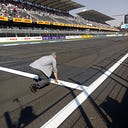I am surprised, and a little disappointed, that Prof. Ishii did not mention the International Monitoring Network of the Comprehensive Test Ban Treaty Organization. In order to put a stop to nuclear testing, over 150 nations are cooperating in collecting and sharing data -- seismological, radiolagical, and hydroacoustic. Prior to the opening for signature of the CTBT, over 2000 (sic!) nuclear tests were conducted over a fifty year period. Between 1995 and 2017, India, Pakistan, and North Korea have conducted about 10. The last 7 years without a nuclear test is the longest stretch since the dawn of the Nuclear Age.
Another interesting point: earthquakes occur somewhat more frequently during high tides. This is because the stresses which have builts up over decades -- even centuries -- have just reached the "tipping point" and the earth tide is the "straw that breaks the camels back." (Pardon the mixed metaphors!) It may not be a coincidence that these two earthquakes occurred as we approached an eclipse
FInal point, fracking can also tip off earthquakes. The stress released is ancient "frozen" stress, the fracking, simply weakens the fault enough for the to be released.
